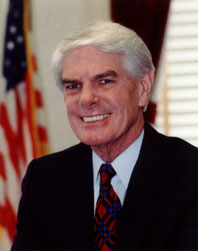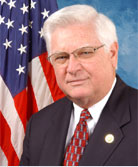- LEGISLATIVE: Congress
- House Leaders & Committee Chairpeople
- Senate Leaders & Committee Chairpeople
- Government Accounting Office (GAO)
- JUDICIAL: Supreme Court
- The Supreme Court
- Federal District Court System
- EXECUTIVE: President
- White House
- US Treasury
- Department of Housing & Urban Development (HUD)
- Department of Defense (DoD)
- Department of Jusice (DOJ)
- OTHER
- Government-Wide Councils
- Government Contractors
Your representatives in Congress authorize the collection of taxes, the issuance of debt and budgets, and the appropriation of funds. If the Executive Branch does not do what they authorize or appropriate, Congress has the power to cut off the money.
[Information is as of the date of construction of this site; for current information, click the title below the name.]
House Leadership
 J. Dennis Hastert Speaker of the House |
 John Boehner House Majority Leader |
|
Former
Tom Delay - House Majority Leader
The Ways and Means Committee
Oversees the government's revenue raising, including taxes.
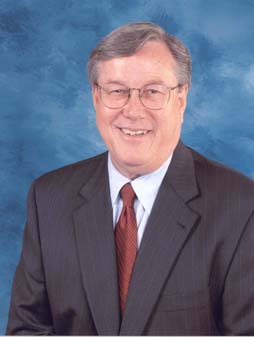
Bill Thomas Chairman Ways and Means Committee |
The Appropriations Committee
Oversees the governments spending and issuance of guarantees, securities
and other obligations.
|
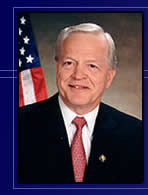 Joe Knollenberg Chairman Subcommittee on Transportation, Treasury, and Housing and Urban Development, The Judiciary, District of Columbia |
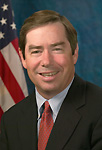 James Walsh Chairman Subcommittee on Military Quality of Life and Veterans Affairs, and Related Agencies |
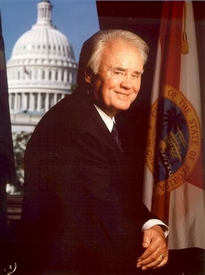 Congressman Bill Young Chairman, Subcommitte on Defense, former Chairman of the Appropriations Committee |
|
 Henry Bonilla Chairman, Subcommittee on Agriculture, Rural Development & FDA |
 David L. Hobson Chairman, Subcommitte on Energy & Water Development |
 Jim Kolbe Chairman, Subcommitt on Foreign Operations & Export Financing |
 Charles H. Taylor Chairman, Subcommittee on Interior and Environment |
 Ralph Regula Chairman, Subcommittee on Labor, Health & Human Services |
 Frank Wolf Chairman, Subcommittee on Science, Departments of State, Justice & Commerce |
The Budget Committee
Oversees the budget which creates the framework within which the Appropriations
Committee works.
Jim Nussle
Chairman, Budget Committee
The Committee on Government Reform
Oversees the management and infrastructure of the federal agencies,
including the 24 agencies covered in the CFO Act, which outlined standards
of financial performance and disclosure.
Tom Davis
Chairman,
Committee on Government Reform
Senate Leadership
Ted Stevens
President Pro Tem
Bill
Frist
Senate Majority Leader
Committee on Finance
Oversees the government's revenue raising, including taxes.
Chuck Grassley
Chairman
Committee on Appropriations
Oversees the governments spending and issuance of guarantees, securities
and other obligations.
All members (2006)
Ted Stevens
Commerce, Justice, & Science
Defense (Chairman)
Homeland Security
Interior and Related Agencies
Labor, HHS, and Education
Transportation, Treasury, the Judiciary,
HUD & Related Agencies
Christopher
("Kit") Bond
Agriculture, Rural Development
Commerce, Justice, and Science
Defense
Energy and Water Development
State, Foreign Operations
Transportation, Treasury, the Judiciary,
HUD & Related Agencies (Chairman)
Richard Shelby
Commerce, Justice, and Science (Chairman)
Defense
Homeland Security
Labor, HHS, and Education
State and Foreign Operations
Transportation, Treasury, the Judiciary,
HUD & Related Agencies
The Budget Committee
Oversees the budget which creates the framework within which the Appropriations
Committee works.
Judd Gregg
Chairman
The Committee on Government Reform
Oversees the management and infrastructure of the federal agencies,
including the 24 agencies covered in the CFO Act, which outlined standards
of financial performance and disclosure.
All members (2006)
Susan Collins
Chairman
Governmental Affairs Committee (now the Committee on Homeland Ssecurity & Governmental Affairs)
Former Chairman
Fred
Thompson
Congress has an auditor to ensure that it has all the smarts necessary to know what is going on in the government and to make sure that what it authorizes is what really happens.
David M.Walker (Clinton 1998)
Comptroller General of the United States
General Accounting Office
The Supreme Court is the highest tribunal in the land for all cases and controversies arising under the constitution or the laws of the United States. As the guardian and interpretor of the constitution, the primary function of the Supreme Court is to ensure equal justice under the law. The US Constitution established three independent and coequal branches of government -- Legislative, Executive, and Judicial. The Supreme Court's role in this system stems from its authority to invalidate legislation or executive actions which it deems to be unconstitutional. In other words, if Congress or the President behave unconstitutionally, it is the duty of the Supreme Court to step in and intervene.
Current
John G. Roberts, Jr. (2005:Bush)
Associate Justice (1975:Ford) John Paul Stevens
Associate Justice (1986:Reagan) Antonin
Scalia
Associate Justice (1988:Reagan) Anthony
M. Kennedy
Associate Justice (1990:Bush) David
H. Souter
Associate Justice (1991:Bush) Clarence
Thomas
Associate Justice (1993:Clinton) Ruth
Bader Ginsburg
Associate Justice (1994:Clinton) Stephen
G. Breyer
Associate Justice (2006:Bush) Samuel A. Alito, Jr.
William
H. Rehnquist
Chief Justice (1986 until his death in 2005)
Previously Associate Justice (1972-1986: nominated by Nixon)
Former
See Members of the
Supreme Court (1789 to Present)
Former
Judge Stanley
Sporkin
The President of the United States is the boss. That means
he and the members of his Cabinent have the ability to cut off monies,
contracts and compensation to an agency, contractor or personnel who
are running their operations in accordance with law. Current
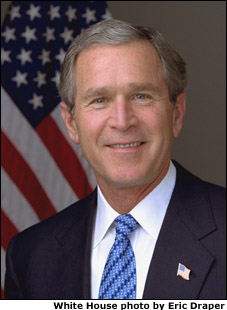
George W. Bush
President
Former
Bill Clinton
Office of Management and Budget
The President has an office in the White House who is in charge of
managing the president's budget and making sure that the agencies
of the federal government are well managed. The head of that office
is the Director of the Office of Management and Budget.
Current:
Rob Portman
Former:
Joshua Bolton
Mitch Daniels
Franklin
Raines
Presidential Councils
President's Council on Integrity and Efficiency: Within OMB, the coordinating committee to oversee the Inspector Generals (auditors) of all the federal agencies is the http://www.ignet.gov/ Assistant to the President for Economic Policy and Director of the National Economic Council: Within the White House, these appointees advise the President on critical economic issues.
Current
Charles P. Blahous
Former
Stephen Friedman
Larry Lindsay
Bob
Rubin
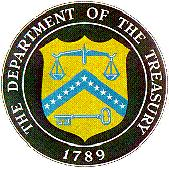
The financial operations and reporting of the government – including the consolidated accounts, cash management and financing – are run by the US Treasury. The Treasury is responsible for the financial integrity of the US government. The Treasury has numerous powers to ensure that an individual agency is complying with the laws regarding financial management and integrity. The US Treasury (including the IRS at Treasury) and selected agencies maintain data regarding who owes the government monies and who the government owes money to. This data is critical to achieving recoveries through the power of offset.
Secretary of Treasury
Current
John Snow (Bush 2003) |
Henry M. Paulson, Jr. (May 2006) |
|---|
Former
Paul
O'Neill (Bush 2001)
Lawrence
Summers (Clinton 1989)
Robert
Rubin (Clinton 1995)
Under Secretary of Domestic Finance
Current
Brian
Roseboro
Former
John (Jerry) Hawke
Gary Gensler
Peter Fischer
The Comptroller of the Currency
Is the lead US banking regulator. If money is missing from the US
government, it is the bank records and IRS records that will show
where it is going.
John (Jerry) Hawke
Comptroller of the Currency
Treasury Inspector General (IG)
The agency's internal auditor. Jeffrey Rush
US Depository
The Treasury is authorized to issue US currency. It does not do so. The creation and management of the US currency has been outsourced to the Federal Reserve. The member banks of the Federal Reserve, including the NY Fed, which is the fiscal agent for the US Treasury, are privately owned. Their equity ownership and policies of sharing financial data with their owners is private.
Current
Ben S. Bernanke
Chairman (Bush 2006)
Federal Reserve System
Former
Alan Greenspan
Wikipedia History of Chairpersons
Current
Timothy
F. Geithner
President & CEO
New York Federal Reserve Bank (Oct 2003)
As Fiscal Agent for US Government and Exchange
Stabilization Fund
Former
William
McDonough

HUD has a large mortgage insurance operation, the Federal Housing Administration (FHA), and a mortgage securities operation, the Government National Mortgage Association (Ginnie Mae). HUD also allocates housing and community development subsidies, much of what support private stocks and private and state and local municipal bonds. HUD has regulatory responsibility for the government sponsored mortgage enterprises, Fannie Mae and Freddie Mac (currently under investigation), which are crucial to the US financial system since they effectively underwrite the mortgage market. HUD is still missing $59.6 billion from FY1999. The FHA remains on the hotlist of top management "challenges" governmentwide.
Secretary of HUD
The Secretary of HUD is the boss. He and his appointees have the power, subject to the pleasure of President, to cut off or impair the monies, contracts or compensation going to HUD offices, contractors or personnel not obeying law or regulation.
Note: Because the HUD operation is highly dependent on Treasury and the Department of Justice, little can happen at HUD without their knowledge or consensus.
Current
Alphonso Jackson (Bush, March 2004)
Former
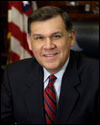
Mel
Martinez (Bush 2001)
Andrew
Cuomo (Clinton 1997)
Other Past
Secretaries of HUD
Assistant Secretary of Housing/FHA Commissioner
Current
Brian D. Montgomery
Former
John C. Weicher
Bill
Apgar
Nic
Retsinas
President of Ginnie Mae
Current
Vacant
Michael J. Frenz
Executive Vice President
Former
Ronnie Rosenfeld
Kevin
Chavers
President of Fannie Mae
Daniel H. Mudd
President and CEO
Former
Chief Financial Officer (CFO)
HUD's consolidated accounts are overseen by its Chief Financial Officer.
Current
John Cox
(Bush 2006)
Former
Carin Barth (Bush 2004)
Angela
Antonelli (Bush 2001)
Richard Keevey
HUD Inspector General (IG)
This is HUD's internal auditor. If money is missing, the IG is supposed to figure out where it went and get it back, or bring in the FBI and Treasury to help it do so.
Current
Kenneth
Donohue (Bush 2002)
Former
Susan Gaffney (Clinton 1993)
OFHEO (Office of Federal Housing Enterprise Oversight)
This office oversees the government sponsored mortgage enterprises, Freddie Mac and Fannie Mae.
Current
James B. Lockhart III (Bush 2006)
Director, OFHEO
Former
Armando Falcon (Clinton 1999)
Kevin
Chavers (Clinton 1997)
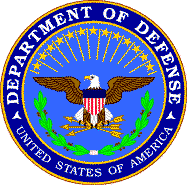 The Department of Defense (DOD) is run by the President, as commander-in-chief,
and the Secretary of Defense. The DOD includes the pentagon, the military
forces such as Army, Navy, Air Force, offices such as Joint Chiefs
of Staff, plus various agencies
such as the National Security Agency (NSA).
The Department of Defense (DOD) is run by the President, as commander-in-chief,
and the Secretary of Defense. The DOD includes the pentagon, the military
forces such as Army, Navy, Air Force, offices such as Joint Chiefs
of Staff, plus various agencies
such as the National Security Agency (NSA).
Secretary of Defense
The Secretary of Defense is the boss. He and his appointees have the power, subject to the pleasure of President, to cut off or impair the monies, contracts or compensation going to the various armed services, DOD offices, contractors or personnel not obeying law or regulation.
Current:
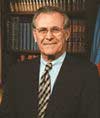
Donald
Rumsfeld
Secretary of Defense
Former:
William Cohen
Chief Financial Officer (CFO)
Current
Tina Jonas (2004)
Chief Financial Officer
Former
Dov
Zakheim
DoD Inspector General (IG)
Current
Thomas F. Gimble (Bush 2005)
Acting Inspector General
Former
Joseph E. Schmitz (Bush 2001)
Inspector General Historical Data, Federal Departments (March 2006)
Attorney General
The Attorney General is the nation's top enforcement official and is the Department of Justice boss. He and his appointees have the power, subject to the pleasure of President, to cut of or impair the monies, contracts or compensation going to DOJ offices, contractors or personnel not obeying law or regulation.They also have wide latitude to investigate and prosecute government officials and contractors who are not complying with laws and regulations and to find and seize back by direct seizure or power of offset, any monies, assets, securities or credits that may have been stolen from or fraudulently issued by the federal government.
Current

Alberto Gonzalez (Bush 2005)
Former
John Ashcroft (Bush 2001)
Janet Reno (Clinton 1993)
Deputy Attorney General
Current
Paul J. McNulty
(Bush 2006)
Former
Jamie Gorelick
(Also see Dillon, Read & The Aristocracy of Prison Profits, Ch 10)
Larry Thompson
Eric
Holder
Office of Professional Responsibility
The Office of Professional Responsibility oversees complaints regarding
unethical behavior by DOJ attorneys. If government money is missing
and DOJ attorneys are doing nothing about it, this Office has the
ability to take actions to hold them accountable.
Current
H. Marshall Jarrett (Reno 1998)
Public Integrity Section - Criminal Division
http://www.usdoj.gov/criminal/pin.html
Current
Noel
Hillman (2001)
Former
Lee
Radek
FBI (Federal Bureau of Investigation)
Financial Crimes Unit
Financial Crimes Report to the Public (May 2005)
DOJ Inspector General (IG)
If someone at DOJ is not doing their job, the IG as the internal auditor
can say or do things about it.
Current
Glenn A. Fine
Former
Michael R. Bromwich
US Chief Financial Officers Council
http://www.cfoc.gov/
US Chief Information Officers Council
http://www.cio.gov/
For a list of selected contractors active at agencies missing money,
see
Missing
Money Articles and Documents -- Government Contractors.
If you believe others should be added to the lists above, or if you can help research data on any of the above people, please visit the Who's Responsible topic on the Forum.
